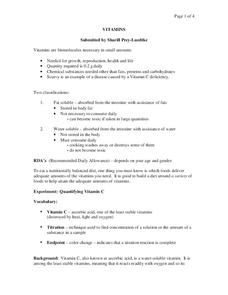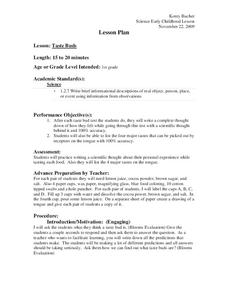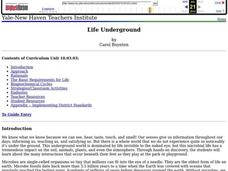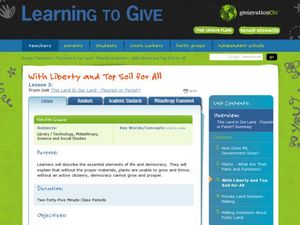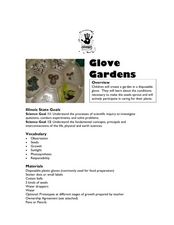Curated OER
Vitamins
Students determine the amount of vitamin C present in 3 samples of juice stored in various light conditions. In this vitamin lesson plan, students investigate the amount of vitamin C present in juice exposed to different quantities of...
Curated OER
Bubbles
Students observe the characteristics of bubbles. In this scientific inquiry instructional activity, students use a bubble solution and a wand to make bubbles and observe their characteristics. Students identify the shape and the color of...
Curated OER
Soil Permeability
Students discuss how soil permeability is affected by permafrost. In this soil lesson plan, students freeze soil over night, and discuss how the environmental conditions of freezing affect soil and further affect vegetation.
Curated OER
Ice Cream Toppings
Students explore the five senses. In this senses instructional activity, students use their senses to top their ice cream. Students compare and contrast the different toppings and write their observations, using descriptive words, in a...
Curated OER
Taste Buds
First graders taste a variety of items and record a full sentence about the way they taste. In this taste buds lesson, 1st graders predict and then taste various items. Students draw a picture of the tongue and show the part that...
Curated OER
What Can We Learn from Artifacts?
Young scholars examine how artifacts are discovered and explore their significance as it pertains to gathering important information. In this artifacts lesson, students obtain knowledge about the way artifacts are excavated and examine...
Curated OER
Life Underground
First graders build a terrarium in order to observe animal and plant life dynamics. In this biology lesson, 1st graders compare how organisms survive in different environments. They write their observations and analysis in their journal.
Curated OER
With Liberty & Top Soil for All
Students compare the basic needs of plants to the basic needs of democracy. In this democracy comparison instructional activity, students complete a worksheet on what happens to a plant that's not nourished. Students draw a correlation...
Curated OER
Why Does a Puddle Shrink?
Fourth graders describe the relationship between heat energy, evaporation and condensation of water on Earth. They compare evaporation rates when the back of the hand and an equal area of a paper towel are moistened with the wet swab.
Curated OER
Plant and Animal Changes
Second graders listen as the book, "What Do Animals Do In Winter?" is read to the class. They discuss that during the winter, some animals migrate, hibernate, hide, change color, and some make changes in their bodies like growing extra...
Curated OER
Calorie Connection
Young scholars calculate the calories in a Brazil nut and the calories needed for daily intake. In this calories lesson plan, students use calorimetry to measure the change in water temperature heated by the burning of a Brazil nut. They...
Curated OER
Glove Gardens
Students investigate how seeds sprout. In this scientific inquiry lesson plan, students make predictions on which seeds will grow the fastest and observe the seeds over a period of time. Observations are recorded into a journal.
Curated OER
The Shape of Things
Sixth graders read and discuss information regarding the shape and attributes of an eggshell. In this shape of things lesson, 6th graders gather relevant information that pertains to the incubation and formation of an eggshell. Students...
Curated OER
Hermit Crabs in the Classroom
Students interact with hermit crabs in the their classroom. In this hermit crab lesson, students handle and observe hermit crabs while learning about their habitats and how to treat animals. They watch how the animals move and answer...
Curated OER
Marine Life Research and Persuasive Conservation Pamphlet
Tenth graders examine conservation and research a type of fish that is under environmental stress. In this conservation lesson students create a pamphlet about the conservation of a marine organism.
Curated OER
ENGINEERING TOOTHPASTE
Students make a class list of household products and discuss how many of these products are made through chemistry. They guess the ingredients in the products and imagine how toothpaste might be made. They make toothpaste.


